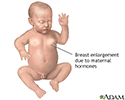Hormonal effects in newborns
Newborn breast swelling; Physiologic leukorrheaHormonal effects in newborns occur because in the womb, babies are exposed to many chemicals (hormones) that are in the mother's bloodstream. After birth, the infants are no longer exposed to these hormones. This exposure may cause temporary conditions in a newborn.
-
Information
Hormones from the mother (maternal hormones) are some of the chemicals that pass through the placenta into the baby's blood during pregnancy. These hormones can affect the baby.
For example, pregnant women produce high levels of the hormone estrogen. This causes breast enlargement in the mother. By the third day after birth, breast swelling may also be seen in newborn boys and girls. Such newborn breast swelling does not last, but it is a common concern among new parents.
The breast swelling should go away by the second week after birth as the hormones leave the newborn's body. DO NOT squeeze or massage the newborn's breasts because this can cause an infection under the skin (abscess).
Hormones from the mother may also cause some fluid to leak from the infant's nipples. This is called witch's milk. It is common and most often goes away within 2 weeks.
Newborn girls may also have temporary changes in the vaginal area.
- The skin tissue around the vaginal area, called the labia, may look puffy as a result of estrogen exposure.
- There may be a white fluid (discharge) from the vagina. This is called physiologic leukorrhea.
- There may also be a small amount of bleeding from the vagina.
These changes are common and should slowly go away over the first 2 months of life.
##RemoveMe##
References
Gevers EF, Fischer DA, Dattani MT. Fetal and neonatal endocrinology. In: Jameson JL, De Groot LJ, de Kretser DM, et al, eds. Endocrinology: Adult and Pediatric. 7th ed. Philadelphia, PA: Elsevier Saunders; 2016:chap 145.
Rennie JM. Examination of the newborn. In: Rennie J, ed. Rennie and Roberton's Textbook of Neonatology. 5th ed. Philadelphia, PA: Elsevier; 2012:chap 14.




